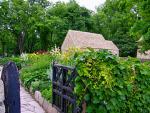Gardening, in an organic way, is mainly a combination of different essential elements. Fertile soil, natural manure, natural seeds, sufficient sunlight and clean water is all that makes a garden an organic one. It is difficult to shift from garden to organic garden as many factors have already done the damage. So, if you are planning to grow your own garden, opt for an organic one.






 Reply With Quote
Reply With Quote









Bookmarks